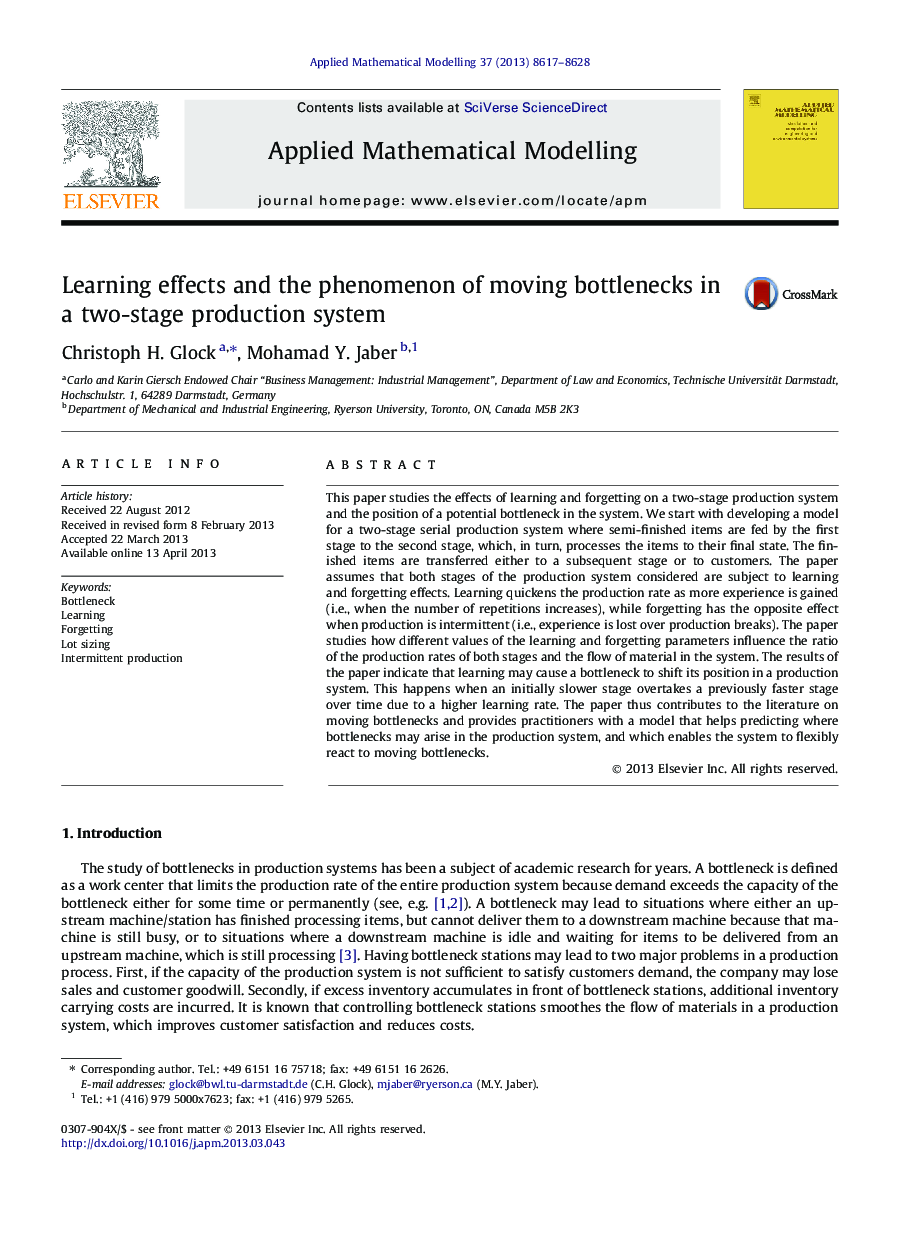| کد مقاله | کد نشریه | سال انتشار | مقاله انگلیسی | نسخه تمام متن |
|---|---|---|---|---|
| 8052985 | 1519416 | 2013 | 12 صفحه PDF | دانلود رایگان |
عنوان انگلیسی مقاله ISI
Learning effects and the phenomenon of moving bottlenecks in a two-stage production system
ترجمه فارسی عنوان
اثرات یادگیری و پدیده تنگناهای حرکتی در یک سیستم تولید دو مرحله ای
دانلود مقاله + سفارش ترجمه
دانلود مقاله ISI انگلیسی
رایگان برای ایرانیان
کلمات کلیدی
تنگنا، یادگیری، فراموش کردن تعداد زیادی اندازه، تولید متناوب،
ترجمه چکیده
در این مقاله اثرات یادگیری و فراموشی بر روی یک سیستم تولید دو مرحلهای و موقعیت گنگی بالقوه در سیستم بررسی شده است. ما با توسعه یک مدل برای یک سیستم تولید سریال دو مرحله ای شروع می کنیم که موارد نیمه تمام از مرحله اول به مرحله دوم تغذیه می شود، که به نوبه خود، موارد را به حالت نهایی خود پردازش می کند. اقلام ساخته شده به مرحله بعدی یا به مشتریان منتقل می شوند. این مقاله فرض می کند که هر دو مرحله سیستم تولیدی در نظر گرفته می شود و اثرات فراموش کردن و یادگیری آن تحت تاثیر قرار می گیرد. یادگیری سرعت تولید را سریعتر می کند، به طوری که تجربیات بیشتر به دست می آید (به عنوان مثال، وقتی تعداد تکرار ها افزایش می یابد)، در حالی که فراموش کردن اثر متضاد زمانی است که تولید متناوب است (به عنوان مثال تجربه بیش از وقفه های تولید از دست رفته است). در مقاله بررسی شده است که چگونه مقادیر مختلف پارامترهای یادگیری و فراموش کردن نسبت میزان تولید هر دو مرحله و جریان مواد در سیستم تاثیر می گذارد. نتایج حاصل از این مقاله نشان می دهد که یادگیری ممکن است سبب تنگنایی موقعیت آن در یک سیستم تولید شود. این اتفاق می افتد زمانی که یک مرحله ابتدایی کندتر با توجه به میزان یادگیری بالاتر، یک مرحله قبلا سریعتر را طی می کند. مقاله به این ترتیب به ادبیات در مورد تداخل های در حال حرکت کمک می کند و تمرینکنندگان را با یک مدل ارائه می دهد که پیش بینی می کند که در سیستم تولید چه نقاطی ممکن است ایجاد شود و این سیستم را قادر به انعطاف پذیری به تنگناهای حرکتی می کند.
موضوعات مرتبط
مهندسی و علوم پایه
سایر رشته های مهندسی
مکانیک محاسباتی
چکیده انگلیسی
This paper studies the effects of learning and forgetting on a two-stage production system and the position of a potential bottleneck in the system. We start with developing a model for a two-stage serial production system where semi-finished items are fed by the first stage to the second stage, which, in turn, processes the items to their final state. The finished items are transferred either to a subsequent stage or to customers. The paper assumes that both stages of the production system considered are subject to learning and forgetting effects. Learning quickens the production rate as more experience is gained (i.e., when the number of repetitions increases), while forgetting has the opposite effect when production is intermittent (i.e., experience is lost over production breaks). The paper studies how different values of the learning and forgetting parameters influence the ratio of the production rates of both stages and the flow of material in the system. The results of the paper indicate that learning may cause a bottleneck to shift its position in a production system. This happens when an initially slower stage overtakes a previously faster stage over time due to a higher learning rate. The paper thus contributes to the literature on moving bottlenecks and provides practitioners with a model that helps predicting where bottlenecks may arise in the production system, and which enables the system to flexibly react to moving bottlenecks.
ناشر
Database: Elsevier - ScienceDirect (ساینس دایرکت)
Journal: Applied Mathematical Modelling - Volume 37, Issues 18â19, 1 October 2013, Pages 8617-8628
Journal: Applied Mathematical Modelling - Volume 37, Issues 18â19, 1 October 2013, Pages 8617-8628
نویسندگان
Christoph H. Glock, Mohamad Y. Jaber,
